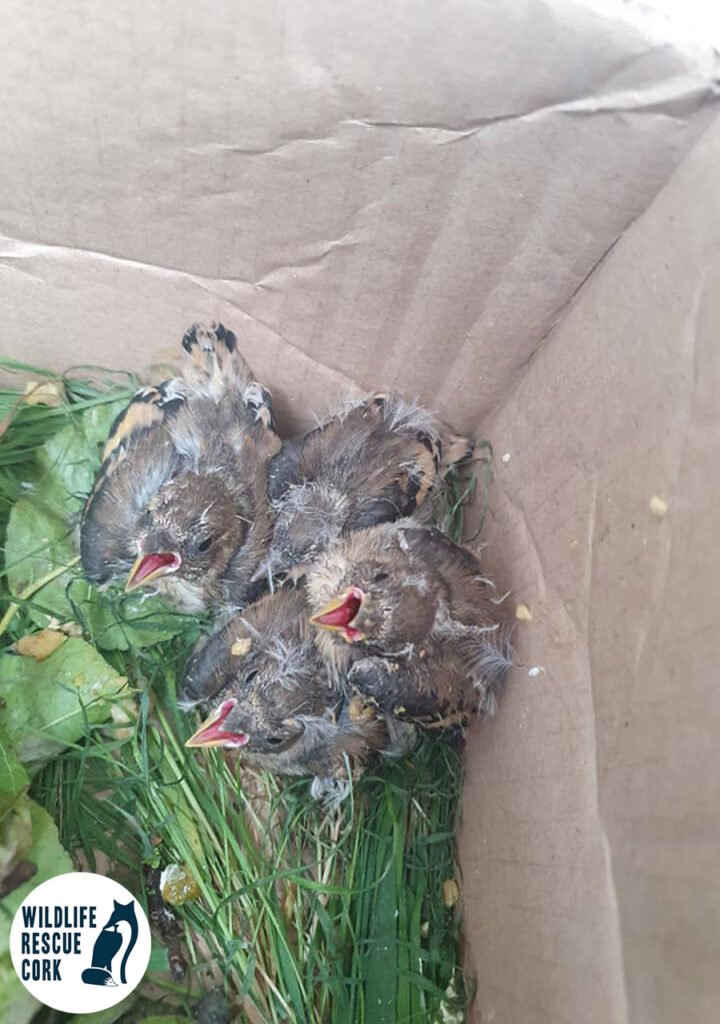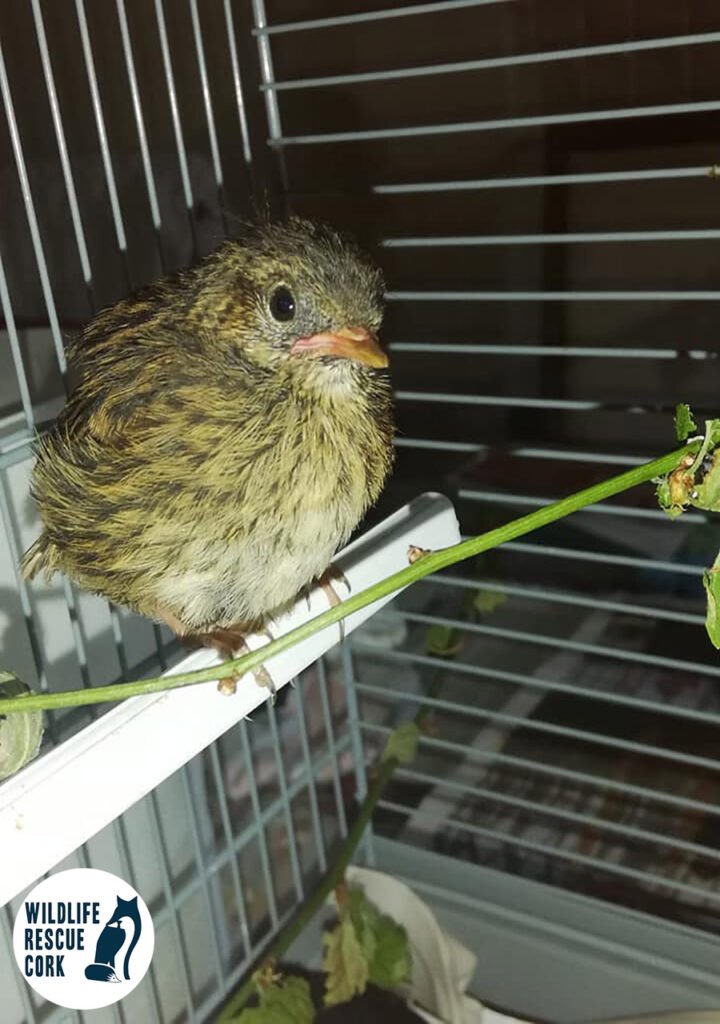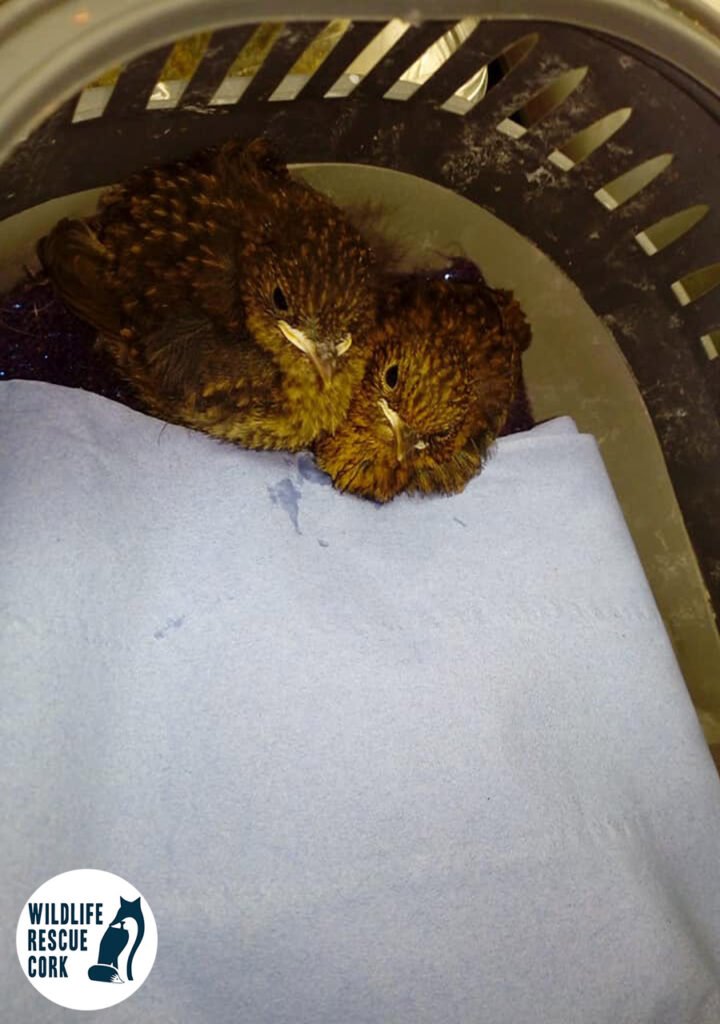
• There are numerous species of garden birds in Ireland. Blackbirds, starlings, pigeons, mistle & song thrush, great/blue/coal tit, goldfinch, chaffinch, robin, crows, rooks, sparrows, swallows and house martins are just some of the regular visitors at WRC •
• These birds can be admitted for many reasons •


• Road traffic accidents, or found on roadside •
• Cat attacks. It is essential if a cat has bitten any wildlife that they receive veterinary care immediately. Cats have Pasteurella Multocida in their mouths which can be fatal for small birds if not treated quickly •
• Window collisions •
• Fallen from nests, tree felling •
• Predated by birds of prey or mammals •
• Stuck in chimneys/houses/attics •
• Missing feathers •
• Unable to walk or fly, (wing/leg breaks) •
• Bacterial or fungal infections (such as canker) •
• Fledgling birds picked up as people think they need help •


• Are both wings symmetrical and sitting up on body or one dropping down? •
• Can it stand or is it falling over? •
• Does it have all its feathers? •
• Is there any blood on the animal? •
• Does the beak look normal? •
• Are both eyes open? •
• Is it eating and drinking? •
• You should never be able to walk up to a wild bird and be able to pick it up, (with the exception of fledglings who are too young and inexperienced to fly away). If you can walk up to a bird and pick it up there is something seriously wrong. Please reach out for help •


• The most common animal we get in each year is ‘fledglings’ from a variety of bird species. The majority of birds have evolved to be tended to in the nest for a number of weeks and then they jump out or ‘fledge’ and spend a few days on the ground learning to fly and build up the muscle mass in their wings. This is perfectly normal behaviour; the parents continue to feed them on the ground during this time. Do not kidnap them to ‘help them’. They are perfectly fine where they are •
• The bigger the species or the heavier they are, the more time it may take them to learn to fly •


• Cat has brought it in or attacked it. (We get many calls saying people are worried the cat might get it. Please bring your cat in for a few days to give the birds a chance to fledge and fly away. We can’t possibly take in each bird that ‘may’ get into trouble so please help it by keeping your cat indoors. We would have hundreds of extra birds in if we took everything that ‘might’ be harmed. Much as we would like to protect everything, it’s just not feasible) •
• If the cat has harmed the bird, it will need antibiotics ASAP from a veterinarian •
• If the bird is sitting on a road, move it under the nearest hedge away from danger •
• If it looks stunned or fluffed up or is laying on its side, please reach out to us •


• Rearing nestling & fledgling birds are a huge undertaking. Many require feeding every 20-30 minutes from dawn to dusk. The parents will always do a better job than us but if it is essential for them to come in, we do our best to fill their shoes •
• Once fledged and self-feeding, we put them in an outside aviary to acclimatise them to the weather to give them more space and the best chance of survival •
• Imprinting is also a serious issue. Birds and mammals can become accustomed to people and this can be detrimental. They should always retain their wild instinct and interaction should always be done just for feeding and cleaning. We stay hands-off as much as possible •


• If you decide to support feed the garden birds it is ESSENTIAL that you CLEAN and DISINFECT your bird feeders regularly with disinfectant. Make sure to rinse thoroughly before restocking with seeds •
• Diseases can be picked up at communal feeders such as canker, this becomes a debilitating and fatal disease and the fungus grows in the throat which eventually makes it impossible to eat or swallow leading to starvation. These birds are often seen fluffed up, and looking unwell. Late stages of the disease might have open beaks (hard to breathe) due to growths and a substance in the mouth such as seeds stuck, or yellow soft cheese looking growths •
• Leave out fresh water for drinking. Again, clean regularly. It can also help birds a lot to have a bird bath where they can wash in safety. Use clean fresh rainwater if possible •
• Make sure your feeders, water and water baths are near hedges/trees so they can flee to safety if a predator comes •


• These are migratory species that travel huge distances to summer and nest in Ireland. Their numbers are hugely declining each year. They are a huge help as similar to bats they eat thousands of flying insects like mosquitos •
• Nests are made from saliva and mud; in really dry weather they can crack. Last year we also had some nests in from people who had watched their neighbours power washing the nests off as ‘they were making the place dirty’. Apart from this being illegal to destroy/remove active nests, it is unethical to kill something for your own vanity. Some of these chicks survived the fall, others did not •


• If you have been asked told to rescue the bird, using a glove or light cloth you can scoop the bird into a box. Make sure you have a tea towel on the bottom for it to grip onto •
• Cover the box making sure there is enough air holes for circulation (although hole size should be considered so they don’t escape) •
• Leave somewhere safe, warm and quiet. Get it to a rehabilitator ASAP. Unless instructed to do so from the rehabber, do not be tempted to feed it yourself without advice •
• DO NOT hold it to ‘comfort it’. Although it might be soothing for you to be holding it, it is not helpful to the bird. Normally the only time they are contained and held is when a predator Is about to eat them so put them into the box and leave them somewhere warm and quiet •
• DO NOT talk to the bird to soothe it. Again, it has no experience with people and will presume you are a predator. It can lead the bird to have a heart attack and die •


• Gilabbey vets, Togher •
• Riverview vets, Ballincollig •
• Riverview vets, Carrigaline •
• Riverview vets, Kinsale •
• Riverview vets, Bandon •
• Animal care hospital, Douglas •
“Goolds vets, Mahon”
• Jerry McCarthy vets, Skibbereen •
• Faxbridge vets, Clonakilty •
• PawPaws vets, Cork city •


• Destroy/remove/interfere with any active nest •
• Remove wild birds unless you possess a licence from the NPWS •
• Photograph active nests, again a license is needed from the NPWS •
• Birds will not necessarily abandon nests due to ‘smelling the human touch on eggs’, or if placing a chick back in a nest, however regular disturbance and looking in to a nest will lead to abandonment to the detriment of the chicks. If the parent sees you doing it, they could assume you have predated their babies and move on and abandon them as they will be afraid to be predated themselves •
• I know it’s exciting and wonderful to watch birds growing in your garden but watch from a distance and give them the space they deserve. Its always best to observe nature from a distance and leave them get on with it •
• Birds have excellent vision, good hearing and some birds have a developed sense of smell. For example, starlings have been studied and recorded taking aromatic plant leaves to use for their nest, this appears to also keep ectoparasites such as lice at bay. Starlings have been recorded identifying which plants to pick based on recognising smell •